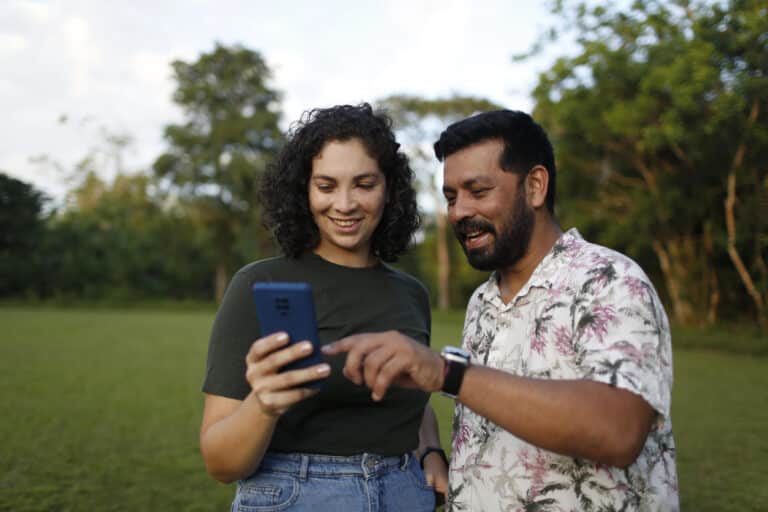How to keep your field research running
Before I started my current role, I was an Analyst for an International Development Research Firm. By that point in my career, I was no longer out in the field doing data collection; my team and I managed enumerators from afar. Since we did fieldwork research in remote conflict areas, we often experienced unstable internet. I can’t remember a single project when we had excellent internet connection throughout!
Fortunately, we found a solution: SurveyCTO, a mobile data collection platform for researchers and international development professionals working in offline settings. (Yes, I was a customer first!) However, whether or not you have access to a tool like SurveyCTO, you need a backup plan in the field that enumerators can follow when they can’t collect data normally with their mobile devices.
My tips for dealing with unstable internet when doing fieldwork research:
- Always plan for the unexpected.
- Choose the backup plan that’s best for your organization.
- Make the backup solution part of the project plan from day one.
- Train your enumerators thoroughly.
Tip 1: Always plan for the unexpected

Even if you think you’ll have a strong internet connection in the field, always plan for the worst case. You never know.
For example, I live in West Africa. We typically have great internet where I live. But last year, the government shut off internet access in certain cities due to a political situation. Imagine if you were doing fieldwork during this time — you’d need a backup plan.
Tip 2: Choose the backup plan that’s best for your organization
Choose a backup plan in advance so your field team can collect data as planned if they lose internet access unexpectedly while out in the field.
I like to think of backup plans in two categories: “temporary fix” and “sustainable solution.”
Temporary fix: pen and paper interviews (PAPI)
The most common temporary fix for when the internet cuts out is to grab a pen and some paper. However, this should be a last resort because using pen and paper to collect data in the field opens you up to data quality and security problems.
Potential data quality problems: Your programs are only as strong as the data they are built on. And without a mobile device to store data collection forms and sync them with your database, there’s more room for human error. An enumerator may misread handwritten information — or they may mistype data when transferring handwritten notes to the database later on. Reproducibility also comes into play here: without a mobile device with GPS, you have no digital proof that enumerators went where they said they did. Certain surveys must be carried out several times with the same conditions; knowing where and when collection happened is critical. Pen and paper don’t provide that certainty.
Potential data security problems: If you’re like me, you work in service of vulnerable populations — and you care deeply about their welfare. The last thing you’d want is for a sheet of paper containing highly sensitive information to fall into the wrong hands and jeopardize someone’s safety. Pen and paper opens you up to serious data security issues.
Pen and paper should be a temporary backup solution while you work to set up a sustainable solution that minimizes data quality and security risk.
Temporary fix: recorded interviews
If your mobile devices allow enumerators to record the conversation, this solution can work in a pinch. Recording and later transcribing interviews is better than pen and paper simply because there’s an accurate record of exactly what was said should you need to reference or correct the data upon finding an outlier that appears to be implausible (for example, an arm measurement that is wildly different from all other arm measurements).
But like pen and paper, recorded interviews are a temporary fix, not a long-term solution.
Sustainable solution: a mobile data collection platform with offline functionality
Whether you choose SurveyCTO, or any other mobile data collection tool that meets your needs, what’s most important is that your survey platform:
- Allows enumerators to collect data in the field using a mobile device — even when there’s no internet connection
- Uploads collected data to your database later on when the mobile device can connect to the internet
- Has GPS data collection capabilities, so you can ensure your field team went where they said they did and when they said they did
- Lets you create built-in quality checks that flag possible bad responses in real-time, so that your team can correct errors in their work to ensure high-quality data
- Takes data security seriously (this means only the people who legitimately need to see private data can see it)
Tip 3: Make the backup solution part of the project plan from day one

Planning for how your field team will deal with unstable internet can not be an afterthought. Instead, you should develop the project plan to account for the possibility of having no internet connection.
Why is it important to plan ahead?
First, it’s costly to send enumerators back out into the field because there was a problem you hadn’t accounted for. Even extending the data collection period by a few days can rack up unnecessary costs.
Second, you’ll need to be sure that all enumerators have the appropriate equipment — whether that be pen and paper or a mobile device:
- If you’re collecting sensitive data in an area where sharing personal information could cause problems for your interview subjects, don’t send 20 enumerators into the field carrying large tablets. Even pen and paper could look suspicious! A cell phone would be a more discreet option. Your local field team can advise you here: they know the local context best and should be brought into the project planning conversation early on.
- If you’re thinking of having enumerators use their own devices, be sure those devices have offline GPS capabilities. Most newer phones have this, but older phones may not.
- If you need to supply your field team with mobile devices, leave yourself plenty of time to order those as delays could happen.
Final tip: Train your enumerators thoroughly
Due to the sensitivity of the data collected inside international development or similar projects, enumerators need specific instructions to use your designated offline method in a way that minimizes data quality and security risks. It’s important to ensure they fully understand what they need to do if there are changes to their internet access to ensure the success of their fieldwork.
If you’re a SurveyCTO customer, we are happy to help you plan training to ensure your project success! Get in touch with our success team through our support center to learn more.




